Small yet mighty, chia seeds could well be considered a tiny superfood. Once mostly famous for putting the green on Chia Pets, it’s the health benefits of chia seeds that are really catching attention today.
Easy to add to your diet, these little black seeds are filled with nutrients that are good for your digestion, heart, bones, and skin. They have the potential to aid weight loss and lower inflammation in your body due to their powerful antioxidants and other plant compounds.
Here’s more about chia seeds, their outstanding nutritional content, and what research has to say about how they can boost your health.
What Are Chia Seeds?
The familiar black chia seeds you can buy in almost any store come from the chia plant- also known as Salvia hispanica. A related plant, Salvia columbariae, produces golden chia seeds. They have similar properties to the black ones but are less commonly available.
Chia plants and seeds hail from the countries of Mexico and Guatemala. They are cultivated today in many areas of North and South America.
Grown in the wild or in cultivation, chia plants are not like the tiny sprouts you see on Chia Pets. They grow 3-6′ tall and bloom with purple or blue flowers. Once the flowers have faded, the seeds are harvested and dried fully before being sold.
If you’ve ever eaten chia seeds, you know they have interesting properties.
Sprinkled on top of foods, they add a nice crunch and mild flavor. However, if you soak them in liquid, they become very thick and gel-like. You can use them as a natural thickener and even as an egg replacement in recipes.
History of Chia Seeds & Use in Traditional Medicine
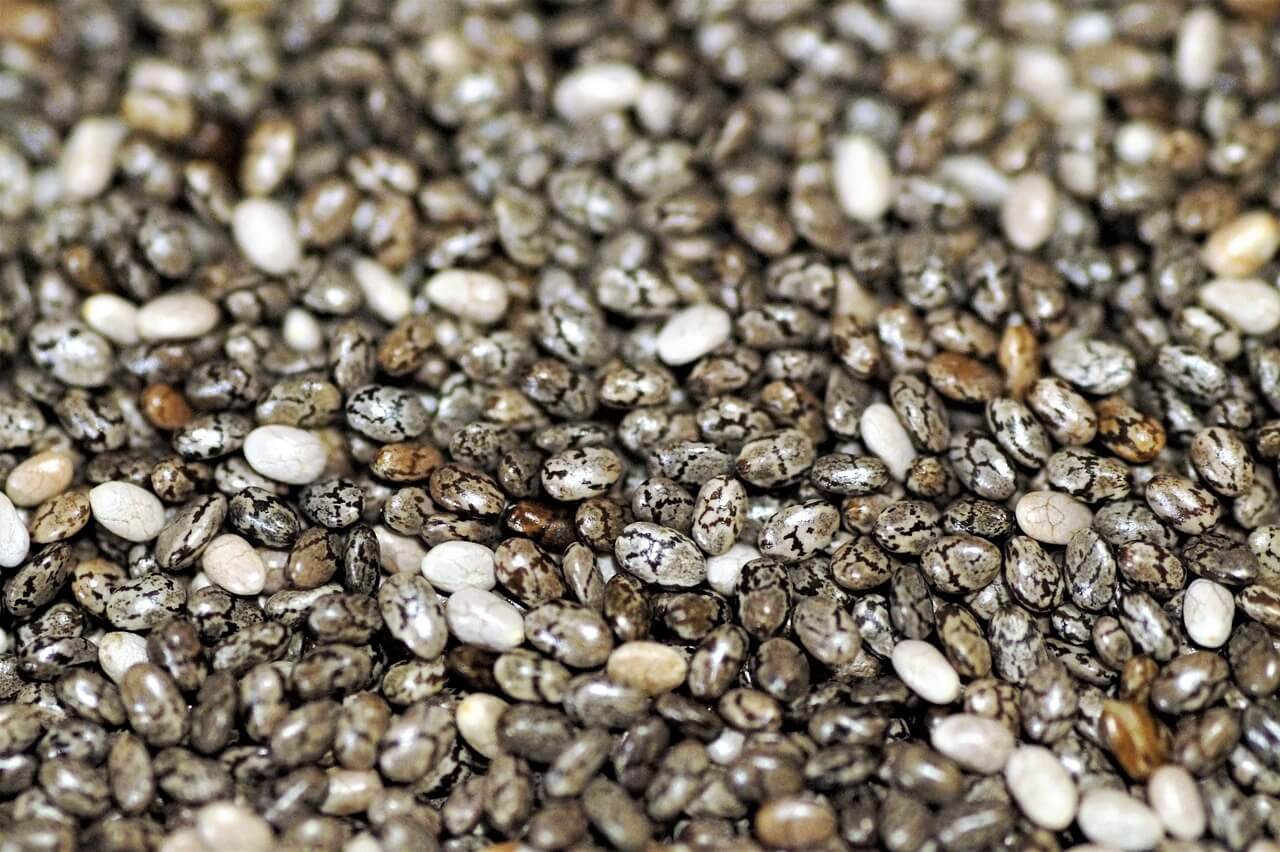
Chia seeds were once an important food source for the Aztecs and Mayans who used to live where chia plants were native. They valued them as a highly nutritional food and even used them as currency and for trade.
The word “chia” actually comes from the ancient Mayan word for “strength.” This is because chia seeds were often consumed for the energy and endurance they gave. They were especially prized by runners and warriors who would consume the seeds before battles and long-distance races.
Besides being valued as food, the health benefits of chia seeds were well-known in traditional medicinal practices. They were also thought to endow warriors with stamina and were even used in religious rituals.
Ayurvedic medicine values chia for health as well. The seeds are considered to be nourishing for the blood and able to support digestion and lower inflammation.
With such a rich history, it’s no wonder chia seeds have stuck around as one of the healthiest foods you can eat!
Outstanding Nutritional Health Benefits of Chia Seeds
Much of the goodness of chia comes from the nutrients packed into the tiny seeds. These are the top nutritional benefits you can get by consuming these seeds regularly.
High in Several Important Minerals
Chia seeds are one of the best sources of several important nutrients. They don’t have a noticeable amount of many vitamins but are packed full of certain minerals.
Just a one ounce serving (about two tablespoons) contains a high amount of calcium (18% DV), magnesium (23% DV), manganese (30% DV), phosphorus (27% DV), and zinc (7% DV). They also have smaller amounts of potassium, copper, and some B vitamins.
Magnesium is one of the most common minerals lacking in the Western diet. It’s important for sleep, metabolism, muscle health, heart health, and much more, but many people are deficient.
Calcium is another essential nutrient and the most abundant mineral in the human body. It is incredibly important for bone health and plays a large role in keeping you healthy as you age. The most common source of calcium is dairy products, but chia seeds are one of the best plant-based sources and even rival milk for calcium content.
Manganese and phosphorus are less familiar minerals but still essential for overall health. Manganese plays many roles in the body and is involved in metabolism, blood clotting, and immune response. Phosphorus is important for bone health and energy storage.
Finally, though one ounce of chia seeds contains only about 3% DV of copper, it’s important for many of us to get more of this antioxidant mineral that is needed for heart health.
High in Dietary Fiber
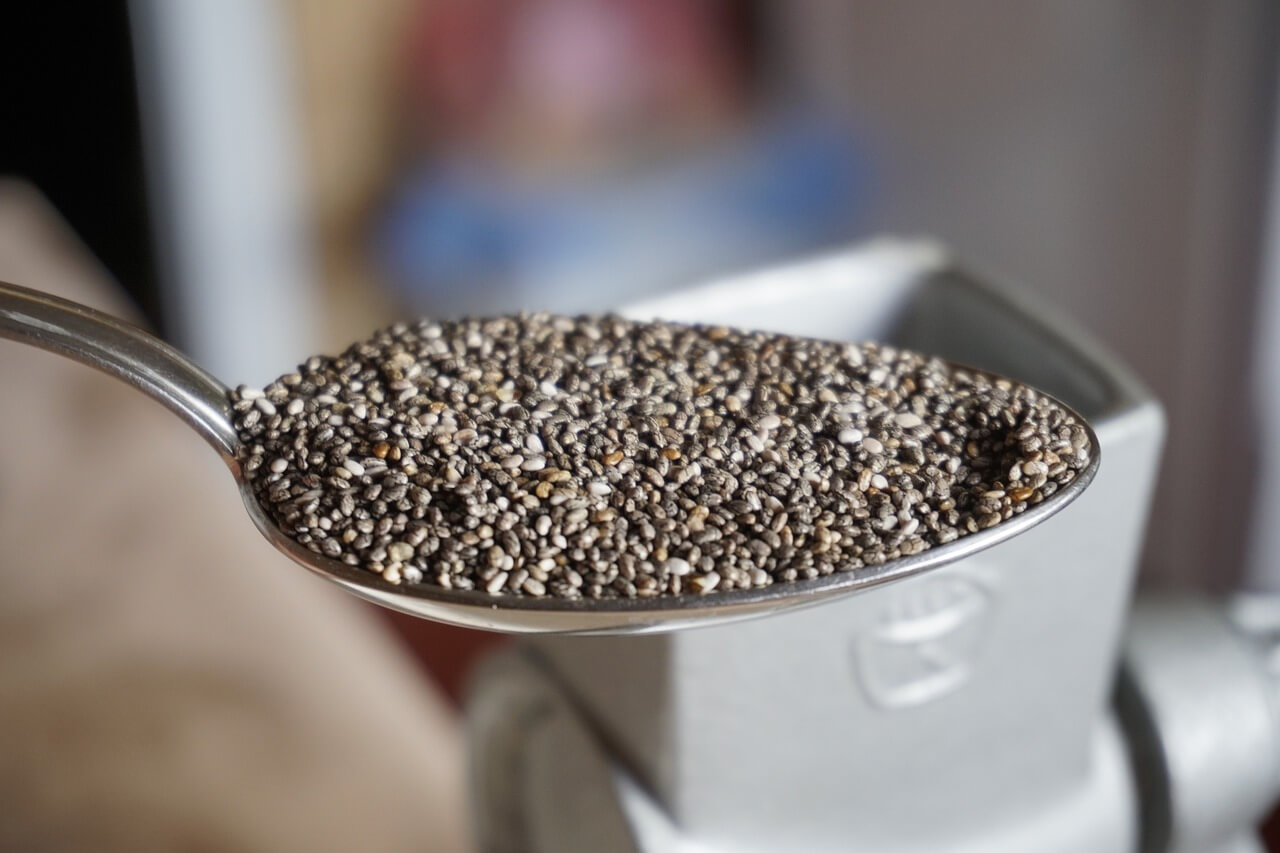
Chia seeds are made up of about 46% carbohydrates by weight. More than 80% of those carbohydrates are in the form of fiber, making chia a very healthy high-carb food.
Just two tablespoons of chia seeds gives you almost 11 grams of fiber, which is about 42% of the recommended daily value! If you ate that amount everyday, you’d be almost halfway to the recommended fiber intake on chia alone.
There are even more health benefits to the fiber in chia seeds because most of it is insoluble. Insoluble fiber is the type that doesn’t break down in your body. It pulls in water as it goes through your digestion, promoting colon and bowel health.
Some research even indicates that insoluble fiber can improve insulin sensitivity and may reduce your diabetes risk.
High in Health-Boosting Omega-3 Fatty Acids
Like other seeds, chia is high in omega-3 fatty acids. About 34% of their makeup by weight is fat, and around 75% of that fat is omega-3. Another 20% of the fat content is omega-6 fatty acids.
Omega-3 fatty acids have been much researched for their health-promoting properties. Studies link them to heart health, brain health, eye health, and the prevention of several age-related diseases.
It’s important to note that the main type of omega-3 found in chia seeds is alpha-linolenic acid (ALA). ALA needs to be converted into the active forms of eicosapentaenoic acid (EPA) and docosahexaenoic acid (DHA) before it can be used by your body.
The conversion process of ALA into EPA and DHA is very inefficient. For this reason, ALA is often considered inferior to the other two.
However, recent studies indicate that ALA has its own benefits, particularly for heart health and for potentially lowering the risk of a stroke. And chia seeds remain the best plant-based source of ALA omega-3 fatty acids.
Research also shows that consuming chia seeds increases EPA levels in your body. If you follow a plant-based diet and consume chia regularly, you would only need to add something like an algae supplement to get the missing DHA.
Good Amount of Plant-Based Protein
Chia seeds have a high amount of protein compared to many other plant foods. They are around 20% protein by weight, which puts them above all cereals and most grains.
Like other seeds, chia is gluten-free. This makes them a great plant-based option for protein if you are allergic or sensitive to gluten.
Even better, chia seeds contain all nine essential amino acids, making them a high-quality protein.
Full of Antioxidants + Other Key Plant Compounds
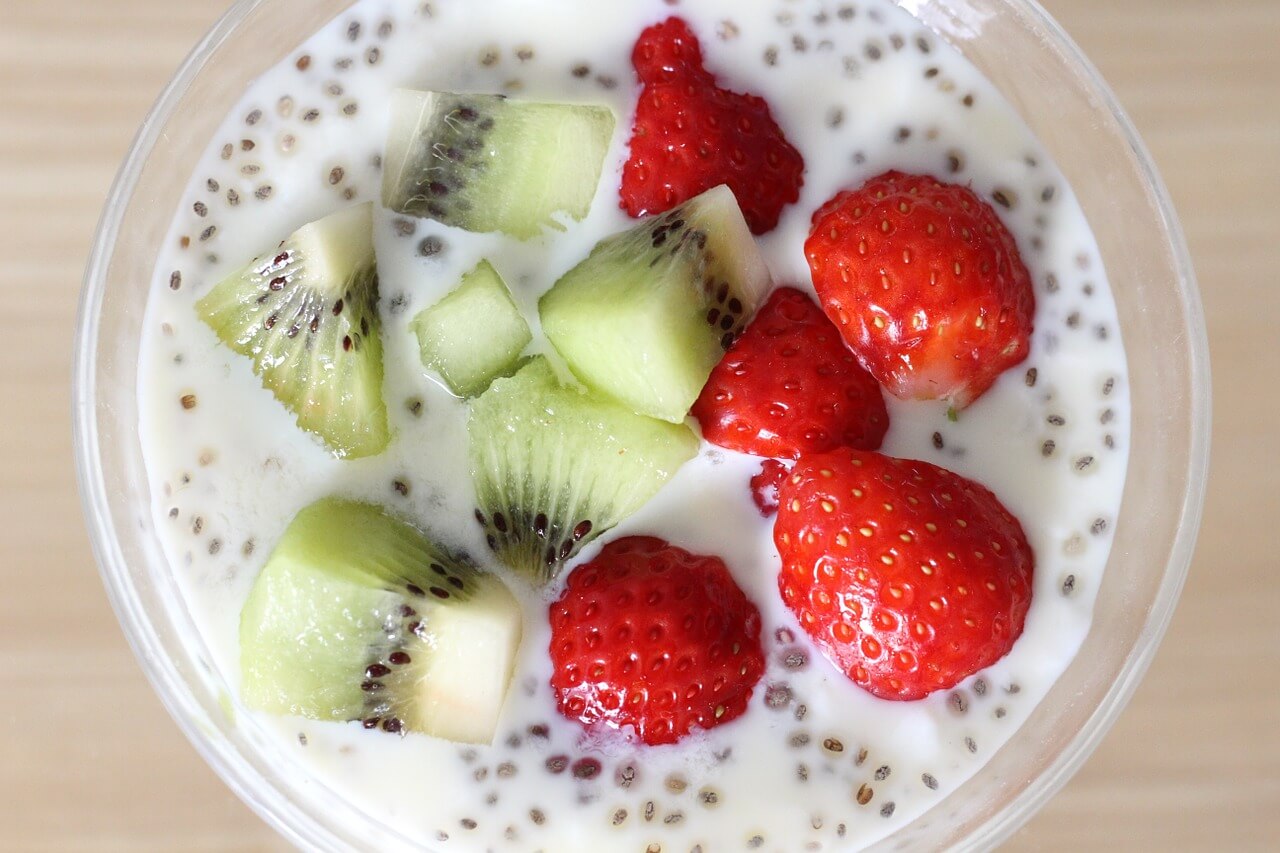
There may be several anti-aging health benefits of chia seeds due to their high antioxidant content. In fact, a 2014 report found that the seeds had almost twice as much antioxidant concentration as previously thought.
Antioxidants are known to benefit your body in many ways. Most notably, they protect against free radical damage that can cause age-related health problems and chronic diseases.
Specifically, chia seeds contain antioxidants like kaempferol and quercetin. Both have been shown in numerous studies to possess anticancer properties. Both also display heart-protective effects, and kaempferol has demonstrated neuroprotective benefits as well.
Caffeic acid, which has known anti-inflammatory properties, is another key compound in chia.
Overall, chia seeds are a great anti-aging food that can boost your daily antioxidant intake.
Other Notable Health Benefits of Chia Seeds
Great for Digestion & A Healthy Gut
The high fiber content of chia seeds makes them very beneficial for your digestive health. They contain both insoluble and soluble fiber, which each have their own benefits.
The large amount of fiber in the seeds pulls in water as they pass through your digestive tract. This results in a softer stool and promotes regularity. It also helps prevent constipation by speeding up the time it takes food to get through your digestive system.
Dietary fiber also acts as a prebiotic, which means it feeds friendly bacteria in your gut. Because certain fibers are not digested by your body, they make it all the way through your intestines to feed the bacteria living there.
Besides aiding your digestion, having healthy gut flora is linked to many other aspects of health, including a good immune system.
Boosts Stamina and Energy

The carbohydrate content of chia seeds make them a good source of energy, especially before exercising. They give your body an easily digestible source of fuel.
One study compared the effects of a chia drink and Gatorade on sports performance. Drinking the chia and drinking Gatorade both enhanced performance in an almost identical way. However, the group that drank half chia and half Gatorade consumed significantly less sugar than the all-Gatorade group.
As a bonus, the protein in chia seeds can help your muscles recover after a workout.
Supports Happy, Healthy Bones
Chia seeds contain several important nutrients for bone health.
Calcium is the most notable one. It’s especially essential for the prevention of osteoporosis, particularly when combined with vitamin D and exercise. While it’s a vital nutrient for everyone, studies indicate that up to 90% of women need more of it in their diet.
Manganese, another nutrient in chia seeds, is also involved in bone health. It may help to reduce bone loss and increase the effects of calcium. One study documented that a manganese, copper, zinc, and calcium supplement was better than calcium alone at preventing spinal bone loss.
Protective of Heart Health
There are a few health benefits of chia seeds for your heart. To start with, both antioxidants and omega-3 fatty acids help protect your heart. They also lower inflammation in your body that can be a contributing factor to heart disease.
Animal studies show that chia seeds may reduce other risk factors for heart disease as well. One study indicated that they can lower triglycerides and raise “good” HDL cholesterol levels. Another documented an improvement in insulin resistance.
Still more studies show that chia seeds can significantly reduce high blood pressure.
Overall, chia can help with risk factors of both heart disease and diabetes. It’s certainly an easy dietary addition to help protect your heart, especially when combined with other lifestyle and dietary changes.
Potential Weight Loss Aid
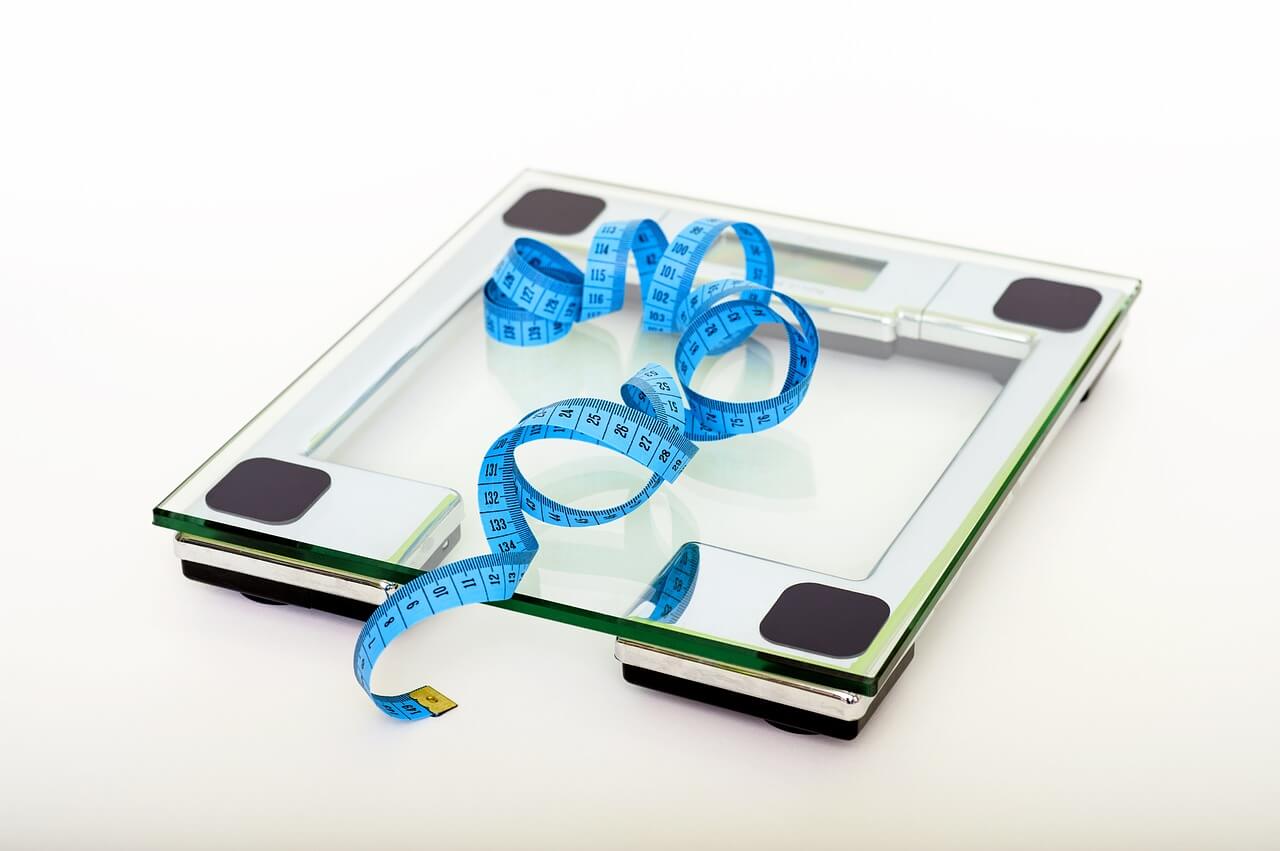
There’s good indication that chia seeds are a food that can help with weight loss. Both fiber and protein have been shown to increase feelings of fullness, which helps you eat less at a meal.
The fiber of chia seeds does this by absorbing water and expanding in your stomach. Protein appears to work in part by reducing levels of the hormone ghrelin, which is what normally stimulates hunger. Adding more protein to your diet can decrease your appetite and promote weight loss.
There have been few specific studies done on chia seeds and weight loss, but one promising study showed a short-term increase in feelings of fullness and a corresponding decrease in food intake.
Are There Precautions with Chia Seeds?
There are no reported side effects associated with consuming chia seeds. The biggest potential problem you can run into is digestive upset from consuming too much fiber. However, this is only likely if you eat a very large amount all at once.
Because chia seeds absorb a lot of water in your digestive tract, it’s best to drink plenty of water when eating them. Some people find they digest chia better by pre-soaking the seeds before consuming them.
Tiny Seeds with Huge Potential
Don’t underestimate the health benefits of chia seeds just because they are small and ordinary-looking! You can get more nutrients and antioxidants from a small amount of chia than you can from large amounts of many other foods.
Regularly consuming chia seeds will only benefit your digestion and overall health. They can be a great aid for losing weight and provide a good, healthy source of energy.
Maybe the best part about chia seeds is that they have a mild flavor and are easy to add to your diet. You can use them to make plant-based puddings, blend them into smoothies, or sprinkle them on almost any meal.
Find a way to incorporate them into your own diet, and power up your body with chia!


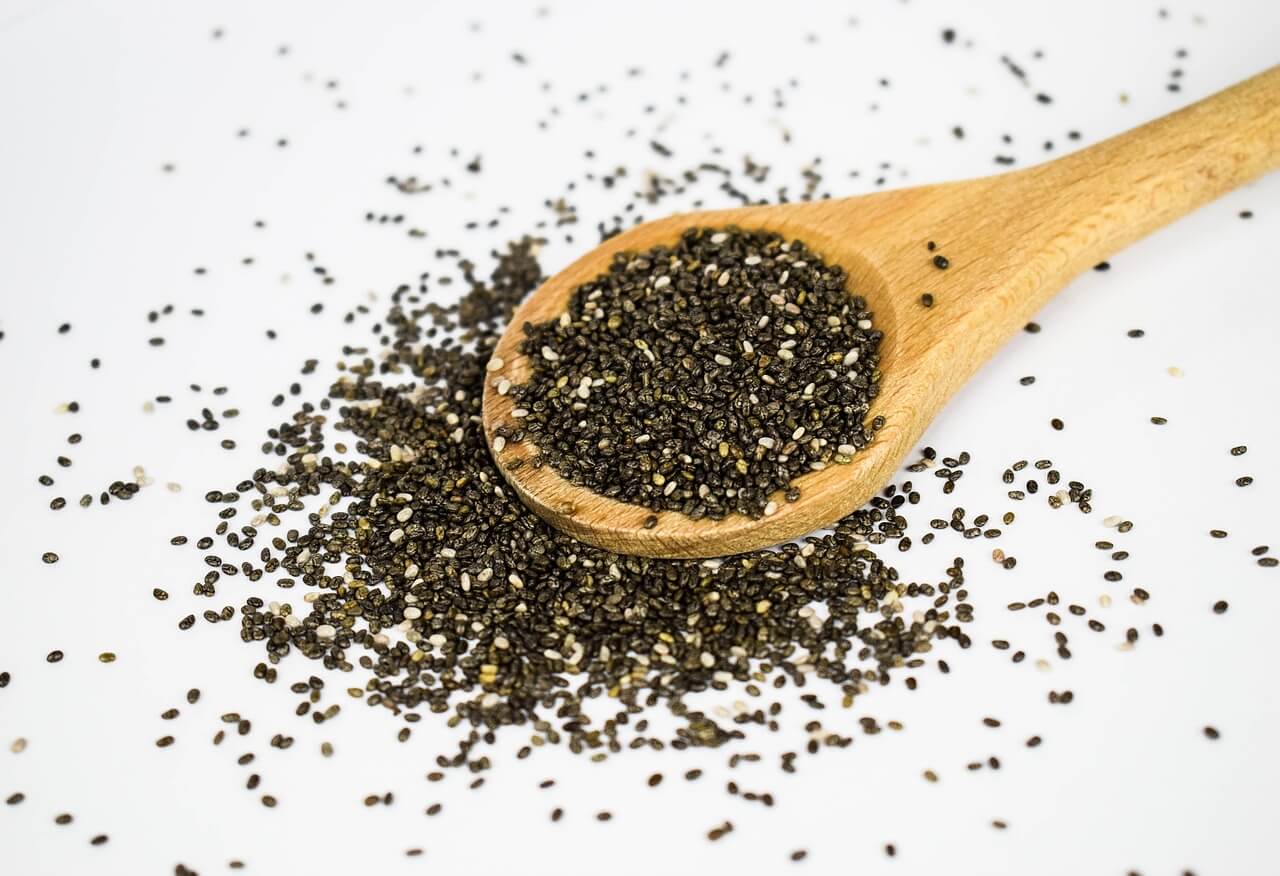
Thanks. Chia seeds were not something I ever knew much about. Thanks so much for this article!
I became dizzy with all the positive properties that you mention. Won’t remember most of them, but will make it my purpose to consuming these seeds daily
Thanks for the great info!
Thanks, they could be bought, some years ago!
Thank You sooo much!
Thanks for the reminder.
I have been eating chia seeds as breakfast every morning jus bcause i love it,until i read all its purposes in the body,im Thankful though to find out how good it is for the body and health..So yeiiii…I been eating the right food for my health.I add fruits on top,sliced almond,pumpkin seeds and i chopped 3 pieces of dates with almond milk ..Sooooo yummmm.
Thank you
Thank. I had purchased some but coildn’t remember why or how to use the. Back in the diet now.
I always add them ti the smoothie that I take to work. By the time I drink the smoothie, they’ve had time to soften.
Chia seeds is full of AWESOMENESS.
Thank you for bringing this awareness to others. 🙏. Enjoy !!
Thanks for the fantastic article! I learned so much about chia seeds and will now include them in my diet since the information you provided makes me realize how beneficial they are to my health.
That is such important information. Thank you. I am going to buy some in the morning.
I have been using them for 3-4 years. I used to use them whole but lately hav3 been grinding them up with flax seeds in a coffee grinder. Which is correct way to consume them?. Whole?
Hi Luann, unlike flax seeds, you can eat chia seeds whole… OR soaked… OR grind them… and they will still pack a wonderful nutritional punch 🙂
Yes I do the same and add them to my oatmeal for breakfast
I do the same! Also love Chia pudding…just a little plant milk and sweetener (ie; date syrup) and soak overnight for yummy pudding…add fruit for extra goodness! 🙂
I have them with berries and ice and a little natural honey and make a smoothie. If you leave it a few minutes, they soften and thicken up uour smoothie.
Love you so much Brian so incredibly grateful for you & your wife and all you do ♥️
Hi Randi, and thank you for the kind words, means a LOT! (Will pass on to my wife, too!)
Thank you for this great info. I will now find more ways to use them in cooking.
Thank you
Should you grind the chia seeds first before you just eat them on food. Dr Brooke Goldner who teaches about getting rid of autoimmune diseases recommends both chia and or flax seeds. Says to grind them in your smoothie so they don’t oxidize in the air. I highly recommend her for all healing concerns. At Goodbyelupus.com. All free info. No money involved.
Hi Debbi, unlike flax seeds, you can eat chia seeds whole, or soaked, or grind them, for great nutritional value. (If you do grind, best to use right away OR store them in airtight container).
I highly recommend–after eating soaked chia seeds most mornings for most of a year now, that they should be included in the diet of all seniors for sure. Would be healthier than taking laxatives’!
Thank you, Brian, most wellcome!
I have Chia seeds in my freezer, and planned to research how to use them. Thanks for the help.
Very interesting chia seeds are a favorite of mine love them as topping for lots of things! Why my horses even get some!
Thank you so very much for the information on Chia Seeds. I will use them daily in my smoothies.
I’ve used them (2tbsp.) with breakfast, not realizing the fiber content. Now, I plan to start using it 3 times a day. Hopefully my health and weight will uptick.
Yes, chia seeds are a great addition to most people’s diets, however anyone who is on anticoagulants, mainly Coumadin or Warfarin, it can quickly alter one’s INR levels. Please monitor carefully when consuming chia in your diet.
For some years now I’ve eaten soaked chia and flax seeds every morning. A teaspoon of each (when dry). 10 years ago I discovered that eaten this way my echema could be kept under control. I even take them on holiday with me as otherwise I’m in trouble!
Great article Thankyou!
Chia – perfect body energizer!….and more. Thank you very much for the details!
Thank you! I eat chia seeds often, but your article is so well written and easy to read that I will probably have them even more often!
I add a tablespoon to my post workout smoothie every day. Now maybe I’ll add 2 😀
I’m a newbie to your site and am just thrilled by the info on aloe vera and now chia seeds. Thank you so much. Wishing good health and happiness to all,
This summer, I have been consistently making chia pudding for breakfast, mixed with fruit, nuts & psyllium husks. I mix 3/4 cup chia seeds with 11/2 cups of organic soy milk + 1 cup of yoghurt (whatever you like) & a slurp of maple syrup. Mix everything together and refrigerate. Does 2 of us about 3 breakfasts worth. Great for digestion, energy and overall health.
Brian,
Because I am a Nurse Practitioner and health crusader, I have read and subscribed to many health and wellness sites. Yours is one of the BEST.
I like the “plain spoken” yet informative information offered on so many topics!
I use chia seeds and flax in smoothies, on toast, and wherever else it can blend in.
I knew it was great fiber and some protein, but didn’t know about all the other good nutritional benefits. Thanks.
P.S. I also love your jokes!
Hi Rebecca, and THANK YOU for the kind words regarding the articles… and my terribly good (or wonderfully bad?) dad jokes 🙂
Fascinating article – THANK YOU!!!
Are Chia-pets also nutrient-dense?
Not certain about the physical benefits of consuming chia pets, but they’re nutrient-dense in terms of lifting one’s spirits 😉
Thanks Brian love reading any of your blogs very interesting, feel much healthier already I add these little powerhouse seeds to all my recipes.
Thank you Brian for this wonderful information. I will be adding them to my diet.
I’m 81 years young. I take no pharma meds and have been blessed with good health. Chia, oats, psyllium husks, ground nuts and seeds and yes a bit of maple syrup makes a delicious breakfast.. I eat nourishing, tasty food and walk three times a week outside ..regulated by the temperature or inside on the stairs.. If your purpose is to be well… do it..no one can/will do it for you. If you don’t make the decision, someone else will. Go and keep going.
Thank you! I knew they were good, I just didn’t know how good. I’ll definitely be using them more.
Thank you Brian. This article was wonderful. I’m really feeling I can trust your information.
I frequently make chia pudding and add some collagen powder. I really enjoyed learning about all the benefits from your article! The pudding is also like a healthy dessert if I’m feeling tempted.
Appreciate you sharing this information. I purchased the anti aging summit and listen to it constantly in the car. I learn something new every time I listen!
Many thanks!
Very informative! I am now motivated to try some. Thanks for all you do to keep us informed.
Wow!!! This is the most comprehensive report on chia seeds I have ever read. I literally loved it! Thank you Brian!
I’ll be on 2 tbsp a day of grinded chia from tomorrow. 🙂
Thank you for this article about the tiny surprise.
Thank you Brian! Love your work. You always explain so well. Am trusting the information you provide in this day and age of uncertainty. Have been using Chia seeds in my salads….will try other options now. You showed a picture of Kiwi and strawberries above….what was that for….are there Chia seeds in Kiwi/strawberries??? Thanks’ again for your dedication/work. Much appreciated.
Thank you for the extensive summary on one of my favorite seeds.
I am not sure that all of the whole chia seeds I eat are being broken down in my GI tract as I see remnants of them later on. Does anybody know if the chia seed is normally broken down during digestion? Could it be that what I often see being expelled is merely the fibrous seed skin (although it tends to look round)? If I don’t get an answer I might have to get beyond the yuck factor and take a sample to the microscope,…
I had no idea chia seeds were so good for you. Now they will be a daily habit. I do have 1 recipe using chia seeds, it’s a pudding but is made with coffee instead of a milk. Surpriseingly very good with a little jogurt on it. Thank you Brian for all the good info.
Thanks for the super chia write up. I love these little guys. I add them every day to my breakfast. Now I see how incredible they are I will work on increasing the amount. Cheers!
Great informative article. I’ve been using Chia seeds off and on (switch up with Flax seeds) for a few years. I love Flax seeds but I have a hand grinder and it’s so much quicker to just use Chia seeds.
I mix in a tablespoon with steelcut oatmeal for breakfast. If I start out the day eating healthy I have a better chance of continuing to eat healthy for the rest of the day.
Thank you for the reminders and new info. I’ve had chia seeds forever, but have forgotten about using them (duh…)
thank you for such useful information
Thanks for posting!
Your information packed articles are beyond the best, Brian. Appreciate your extensive work that goes into them to keep us informed and healtier as we grow older..